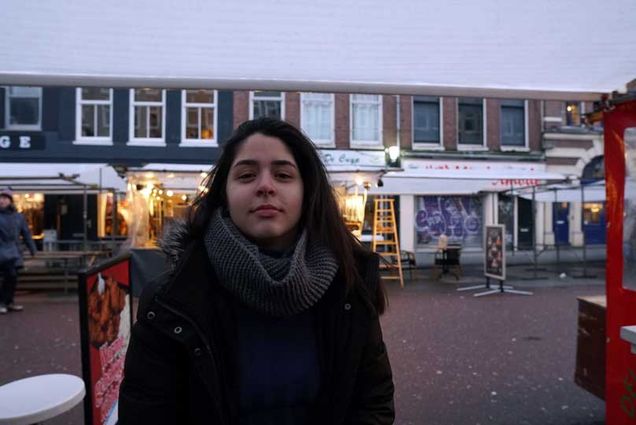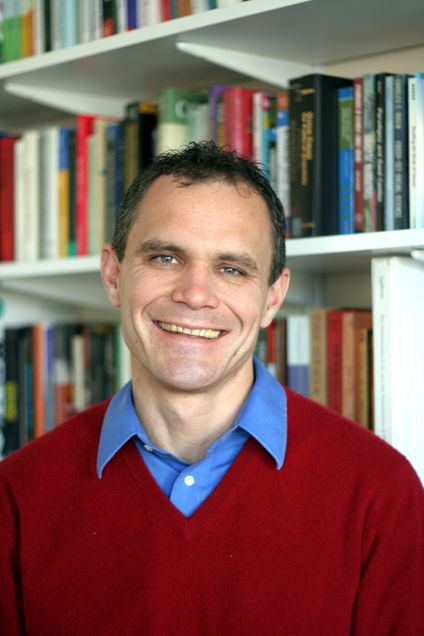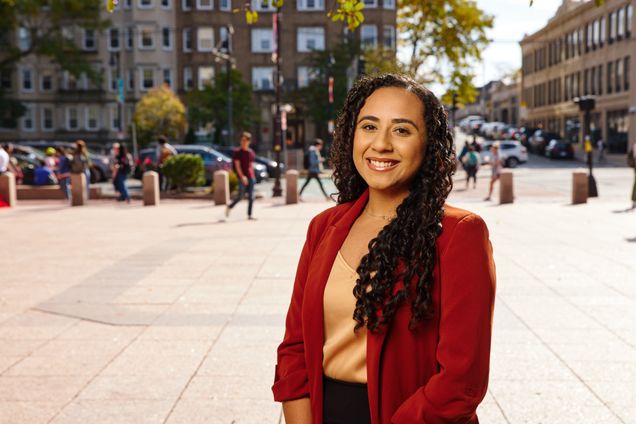By Ashley Duong (COM`25)
When she was searching for a senior thesis topic in political science, Renata Nunes (CAS`20), a double major in history and political science, noticed little research about the Brazilian-American community in political science research journals.
This underrepresentation resonated with Nunes, who was undocumented when she emigrated from Goias, Brazil to Marlborough, Mass., at age 6. Though she later became a legal permanent resident, she saw the struggles that being undocumented brought into her relatives’ lives. Their inability to receive an education or get a job pointed to a common theme of invisibility and discrimination. Nunes decided to explore this underrepresentation in her senior thesis.

“They were, in my opinion, voiceless,” said Nunes. “They carried the weight of, ‘this is what we have to go through. In order to get to a point where we can live the American dream, we have to be undocumented, we have to suffer,’ which is false.”
Nunes’ thesis advisor, Taylor Boas, professor and chair of the department of political science, suggested that she focus on where Brazilian-Americans are represented: in Brazilian elections. Unlike other immigrant groups, Brazilian citizens abroad are required by law to vote, even overseas. Boas explained to her that a majority of Boston Brazilian-Americans voted for Bolsonaro, a far-right 2018 Brazilian presidential candidate, but that there’s no research papers that focus on the rising tide of conservatism of Brazilian immigrants and how their lived experiences contribute to their voting choices. Nunes decided to embark on a research study to understand the political opinions of Brazilians in the Boston area.
“I wanted to provide light and to first, talk about a community that’s not talked about, and second, to talk about the effects of being undocumented and facing this discrimination on a professional and academic level,” said Nunes. “Being undocumented was, if not the number one factor, within the top three factors that motivated me to write this thesis.”
Nunes started by planning focus groups to interview Brazillians in Greater Boston. When the Covid-19 pandemic cut her research short, she improvised, shifting the in-person focus groups to over-the-phone individual interviews. She found that a main driver of individuals’ voting choices was their religious ideology — research that Boas found fascinating.

Inspired by Renata’s findings, Boas decided to delve deeper into this topic, and invited Nunes to return to BU as a research assistant. The two were joined by several other student researchers, including Lara Werneck (CAS`23), the daughter of two Brazilian immigrants who is studying political science with a minor in Portuguese and Brazilian cultural studies.
The study itself consisted of three different components. The first involved administering exit polls at two polling places set up by the Brazilian consulates — one team in Molden, Mass. and the other in Framingham, Mass. — during the Brazilian election on Oct. 2, 2022, and again during the run-off election on Oct. 30. Over the course of two days, the team surveyed 715 people.
The second component of the project involved three two-hour focus groups of 6-12 Brazilian-Americans led by Renata in public libraries in Watertown, Everett, and Revere, Mass., due to these towns being geographically representative of the Boston area. Through questions and discussions, Renata attempted to answer if and how voters’ religious identity played in their political attitudes.
The third and final component consisted of watching livestreamed worship services of 10 Brazilian churches in the Boston area: six evangelical churches and four catholic churches. Every Sunday, between Mid-August and the first week of November, Boas downloaded videos and ran them through a software program that transcribes video. He then analyzed the transcripts to see what they were saying about politics, if anything.
Through this research, Boas and his team found a difference between how Brazilian Americans feel about Brazilian politics in comparison to American politics and local politics. Those that supported Jair Bolsonaro, a 2022 conservative Brazilian presidential candidate that carries similar political ideologies to that of Donald Trump and strongly opposes left-wing policies, did so mostly due to his identity and personality. However, many of those same voters supported Maura Healy, a democratic candidate that supports left-leaning policies like green energy and abortion rights, not because of her personality, but because of her policies: specifically of her stance on immigrants rights.
“People in our study were much more driven by interests when they formed their attitudes about local politics in comparison to Brazilian politics, where they seem to be much more influenced by identity,” said Boas. “It gives us a window into migrants to the United States, what sorts of ties they retain to their home country, and how they navigate dual nationality experience.”

Every time the research team talked to a voter or at the focus groups, Boas gave them a business card with a QR code on the back, leading them to a website, “Religion and Political Attitudes Among Boston-Area Brazilians” so they could see their community represented in academia, as Nunes initially had hoped to find. “This research study causes transformational change,” said Nunes. “Perhaps not in an explicit, huge way, but it can cause a domino effect. It’s a small ripple in the ocean.”
The research also had a personal impact for the research assistants, who felt their community was “seen.”
“The study helps people not see us as just those stereotypes,” said Werneck, who, like Nunes, had experienced discrimination due to her Brazilian background. “We also have academic power and political and religious views, and other things you should care about as well. This research gives me more hope for my community. ”